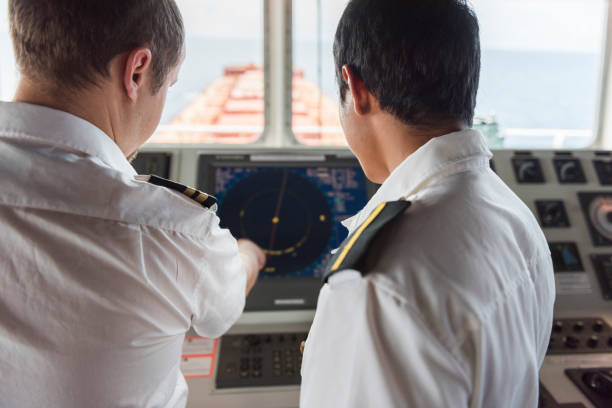Navigating Success: Third Mate Officer Job Description

Navigating the vast expanse of the world’s oceans requires more than just technical expertise; it demands a blend of skill, leadership, and unwavering dedication to safety. At the heart of maritime operations stands the Third Mate Officer, a crucial member of the vessel’s crew entrusted with the responsibility of ensuring smooth navigation and efficient operation. In the dynamic realm of the maritime industry, the role of the Third Mate Officer is indispensable, serving as a beacon of reliability and competence amidst the challenges of the open sea. This article delves into the multifaceted responsibilities and qualifications of the Third Mate Officer, shedding light on their pivotal role in the seamless functioning of maritime endeavors.

Page Contents
Third Mate Officer
Job Overview: As the Third Mate Officer, you hold a critical position in the maritime hierarchy, responsible for assisting in the safe navigation and operation of the vessel. Reporting directly to the Chief Officer or Master, your role encompasses a range of duties vital to the vessel’s safety, including navigation, watchkeeping, cargo operations oversight, and emergency response coordination. With your expertise and leadership, you contribute significantly to the efficient and successful operation of the vessel.
Key Responsibilities
- Navigation and Watchkeeping:
- Assume watch duties on the bridge, maintaining a vigilant lookout for other vessels, navigational hazards, and changes in weather conditions.
- Execute helm commands and maneuver the vessel safely under the direction of the Officer of the Watch.
- Monitor and maintain navigational equipment, including radar, GPS, and electronic chart display systems (ECDIS), to ensure accurate positioning and safe navigation.
- Cargo Operations Oversight:
- Supervise cargo loading and unloading operations, ensuring compliance with stowage plans, safety regulations, and cargo handling procedures.
- Coordinate with the Chief Officer and other deck crew to ensure proper securing, stowage, and documentation of cargo to prevent damage and maintain stability.
- Maintain accurate cargo records and documentation, including cargo manifests, bills of lading, and stowage plans.
- Safety and Emergency Response:
- Participate in emergency drills and exercises, including fire drills, abandon ship procedures, and man-overboard drills.
- Assist in the implementation of emergency procedures and the deployment of life-saving equipment in response to emergencies.
- Conduct regular safety inspections and audits to ensure compliance with maritime regulations and industry standards.
- Navigation Planning and Chart Corrections:
- Assist in voyage planning, including route selection, passage planning, and consideration of navigational hazards and weather conditions.
- Update and correct navigational charts and publications to ensure the accuracy and currency of navigational information.
- Prepare and maintain passage plans, including waypoints, courses, and estimated arrival times.
Qualifications and Skills
- Valid certification as an Officer in Charge of a Navigational Watch (OICNW) or Third Mate (Unlimited) license.
- Bachelor’s degree in maritime studies, nautical science, or a related field preferred.
- Extensive experience in navigation and watchkeeping duties aboard vessels of similar size and type.
- Proficiency in using navigational instruments, electronic chart systems, and voyage planning software.
- Strong leadership, communication, and decision-making skills.
- Knowledge of international maritime regulations, safety protocols, and best practices.
- Ability to work effectively as part of a team and remain calm and focused under pressure.
The Salary Scale
The salary scale for a Third Mate Officer varies widely depending on factors such as the type and size of the vessel, geographical location, and the officer’s level of experience and qualifications. Generally, Third Mate Officers can expect to earn an annual salary ranging from $50,000 to $80,000 (PhP2.5m to 4m), with potential for higher earnings in certain sectors or on larger vessels. Experienced Third Mate Officers with advanced certifications and extensive sea time may command higher salaries, while those working in specialized fields such as offshore oil and gas exploration may receive additional compensation.
Additionally, some employers may offer benefits such as housing, meals, health insurance, and retirement plans as part of the compensation package. The salary of a Third Mate Officer reflects the pivotal role they play in ensuring the safe navigation and operation of vessels, making it a rewarding and fulfilling career path within the maritime industry.
Here are Some Common Benefits that the International Vessel Crew Members may Receive:
- Housing: Some employers provide accommodation on board the vessel for crew members during their work rotations. These accommodations may include individual cabins or shared living quarters, depending on the size and type of vessel.
- Meals: Crew members typically receive meals while on duty, with the cost covered by the employer. Meals are usually provided by onboard catering staff or prepared in the vessel’s galley (kitchen).
- Health Insurance: Many employers offer health insurance coverage for their crew members, which may include medical, dental, and vision insurance. This coverage helps ensure that crew members have access to necessary healthcare services while at sea or during port visits.
- Retirement Benefits: Some employers offer retirement savings plans or pension schemes for their crew members, helping them save for their future financial security.
- Paid Time Off: Crew members may be entitled to paid vacation days or leave periods, allowing them to take time off from work to rest and recharge. The amount of paid time off may vary depending on factors such as length of service and employment contract terms.
- Training and Certification: Employers may provide opportunities for crew members to receive training and obtain additional certifications relevant to their roles and career advancement. This may include safety training, specialized skills training, or courses to obtain higher-level maritime certifications.
- Travel Benefits: Depending on the nature of the vessel’s operations, crew members may have the opportunity to travel to different ports and destinations around the world as part of their job. Some employers may provide travel allowances or reimbursements for crew members’ transportation costs to and from the vessel.
- Employee Assistance Programs (EAPs): EAPs may be available to provide confidential counseling and support services to crew members facing personal or professional challenges while at sea or on shore leave.
Conclusion
As the Third Mate Officer, you play a pivotal role in ensuring the safe and efficient operation of the vessel. With your navigational expertise, leadership skills, and commitment to safety, you contribute significantly to the success of maritime operations. By fulfilling your responsibilities with diligence and professionalism, you help to uphold the highest standards of safety and seamanship, ensuring the vessel’s crew and cargo reach their destinations safely and securely.







